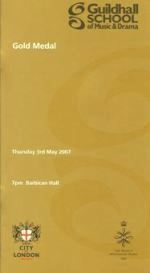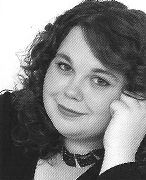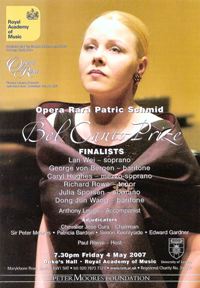|
Guildhall School of Music & Drama Gold Medal 2007
Barbican Hall, 3 May 2007
 The GSMD Gold Medal, awarded in alternate years to singers and instrumentalists, is amongst the most prestigious of music college prizes. It is
staged with full orchestra and its history goes back to 1915. The GSMD Gold Medal, awarded in alternate years to singers and instrumentalists, is amongst the most prestigious of music college prizes. It is
staged with full orchestra and its history goes back to 1915.
By the time the aspirants have been whittled down to four the standard is extremely high and the final, in the impressive setting of the Barbican Hall, has the atmosphere more of a showpiece and celebration of excellence than the tension of competition. Indeed the Guildhall had much to celebrate on this year's occasion since two of the singers we were to hear had, only a few days earlier, made a clean sweep of the main Kathleen Ferrier awards at Wigmore Hall.

With that result still in mind, Katherine Broderick's repeat win didn't surprise anyone but the manner and certitude with which she carried it off were remarkable. During the first part of the concert singers perform with a piano accompanist, and most fill their allotted time with pieces chosen to show a variety of styles and languages. Katherine took the rare step of offering Wolf's four Mignon Lieder, sung with close to technical perfection and whilst never forcing the volume, her voice filled the Hall, making the acoustic work for her.
In the second half of the evening singers are joined on the platform by the Guildhall Symphony Orchestra conducted by Stephen Barlow. Here Katherine's programme consisted of Come scoglio, Casta Diva and Dich, theure Halle – three enormously taxing arias – in a glittering performance with great depth of feeling – oh, and should I just mention that she had spent much of the week rehearsing the role of the Countess in Capriccio. With a clarity that just cuts straight through, floating and shimmering, this is certainly one of the most exciting soprano voices to emerge in recent years.
Benedict Nelson also held his Ferrier form in taking the Glass Trophy. I like the focus this young baritone brings to his characterisations and he possesses the chameleon quality to change mood and vocal colour to suit. His selection of songs showed off his language skills and he brought a gorgeous honeyed tone to Butterworth's Is my team ploughing? Three good arias followed by Mozart, Verdi and Rossini. The last, Largo al factotum being a sure fire winner with the audience.
The other two singers fully merited their place in the competition and, in order of singing, were:
Sophie Angebault a soprano with a tall commanding presence, whose programme concentrated on her native language French repertoire. Her voice has lovely tone, subtle shading, and something of an “instrumental” sound reminiscent of the late and great Suzanne Danco. A persuasive and languorous Asie (from Ravel's Sheherazade ) showed it to advantage, but she just needed to let herself go a bit more with her Puccini aria.
Mezzo soprano Sara Gonzalez Saavedra produced a good earthy sound. Her first two pieces (Bauld's Banquo's uried and Howells' King David) were similarly doom laden and had me mentally casting her as a natural Ulrica. She showed a lighter facet in the second half, opening stylishly with zarzuela and a gutsy romanza from Serrano's Los Claveles “ Damned be my fate, damned be my fortune …”, then following with a warmly seductive Softly awakes my heart .
The Guildhall Symphony Orchestra was in great form, as was the Guildhall Chorus who effectively filled the adjudication period with the Polovtsian Dances. All four accompanists (Annabel Thwaite, Alison Luz, Marc Verter and Jonathan Beatty) provided sensitive support, with the first named being awarded Accompanist's Prize, (for the second time).
1st Prize – Katherine Broderick
2nd Prize – Benedict Nelson
Accompanist's Prize – Annabel Thwaite
Other Finalists - Sophie Angebault – soprano; Sara Gonzalez Saavedra – mezzo soprano
Jury: Dame Josephine Barker; Stephen Barlow; Oliver Condy; Damian Cramer; Simon Keenlyside; Sir John Tusa
Opera Rara Patric Schmid Bel Canto Prize
Duke's Hall, Royal Academy of Music 4 May 2007

In complete contrast to my previous evening at the joyous Guildhall Gold Medal concert, I now joined the aesthetically rarefied realm of the Opera Rara Bel Canto competition. The participants, all students of RAM, had taken part in a preparatory training course. Each offered two arias, which included some real gems of obscurity, and were then required to take part in an ensemble piece. None of the singers seemed particularly comfortable with the style, and it probably did not bring out the best in them.
I found all disappointing to a greater or lesser degree – whilst the technical challenges were reasonably well overcome there was a consistent lack of characterisation. Rather lifeless piano accompaniment from Anthony Legge did little to help, though the ensemble pieces generally went rather better than the solos.
The winner was soprano Julia Sporsen the most experienced singer in the competition ad a finalist last year. She offered a very showy aria from Il Pirata which Callas was notoriously fond of performing and an interesting rarity from Mayr's Medea in Corinto . She held her ensemble trio together very effectively.
Second prize went to Welsh mezzo Caryl Hughes , looking cheerful in a bright red dress and singing with her usual accuracy and attention to detail. She had Una voce poco fa comfortably sung in and showed off some commendably good French in an aria from Donizetti's Dom Sebastien.
Opera Rara had been meticulous in supplying full texts and translations, and the repertoire certainly provided food for thought.
1st Prize – Julia Sporsen - soprano
2nd Prize – Caryl Hughes – mezzo soprano
Other Finalists – Lan Wei – soprano; George von Bergen – baritone; Richard Rowe – tenor; Dong Jun Wang – baritone
Jury Chevalier José Cura; Sir Peter Moores; Patricia Bardon; Simon Keenlyside; Edward Gardner
Serena Fenwick
Opera Rara Patric Schmid Bel Canto Prize 2008
Duke’s Hall, Royal Academy of Music, 23 April 2008
The shortcomings that I reported in the 2007 competition were evident this year also, to an even higher degree. On this occasion there were only four finalists, each performing one song and one aria in the Bel Canto style. Little of this “style” was evident in the performances, though matters improved during the duets when at least something of the drama of the occasion was conveyed.
During the short adjudication interval I reflected on the difficulties facing the panel in reaching their verdict, and opinions being voiced in the audience were equally lukewarm. When the jury returned their Chairman, Adam Pollock, stated quite baldly that they had been disappointed with the standard and were awarding the prize on the basis of effort rather than the level achieved; Narine Ojakhyan was duly named winner.
The one bright spot of the evening had been the piano playing of David Harper, which was a sheer joy throughout, but curiously not credited in the programme.
SF
Other Finalists – Dong Jun Wang – baritone; Emma Carrington – mezzo soprano; Hyung Tae Kim – bass baritone
Jury – Adam Pollock; June Anderson; John Steane; Richard Bonynge; Ann Murray
|

